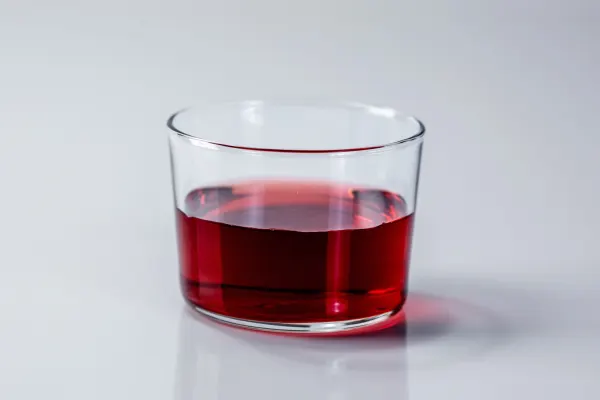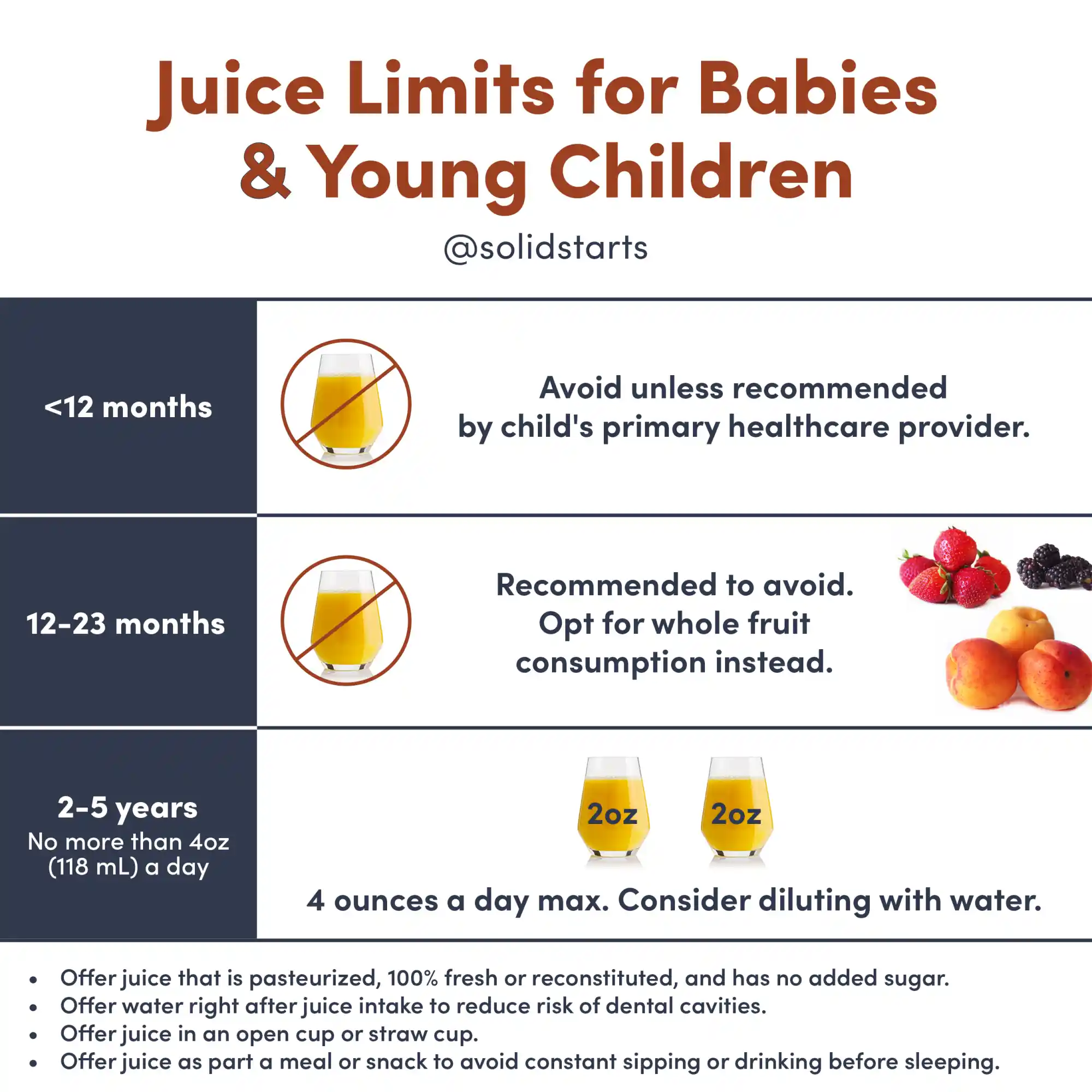Access our First Foods® Database in the Solid Starts App.
Learn moreJuice
Drink
Age Suggestion
12 months
Iron-Rich
No
Common Allergen
No

When can babies have juice?
Juice may be introduced as a drink in small amounts after the first birthday, although there are benefits to waiting until after the second birthday (or longer) to serve regularly. Regular and especially excessive consumption of sweet beverages may reduce the diversity of foods and nutrients consumed, increase the risk of dental cavities, and alter appetite in ways that can negatively affect growth. Avoid serving juice as a drink to babies under 12 months of age unless directed to do so by the child’s healthcare provider.
How do you introduce juice to babies with baby-led weaning?
Every baby develops on their own timeline, and the suggestions on how to cut or prepare particular foods are generalizations for a broad audience.
6 to 11 months old:
Avoid serving juice as a drink, unless recommended by the child’s healthcare provider. Breast/human milk, formula, and small amounts of water are the only drinks that baby needs to meet their nutritional and hydration needs at this age. It is fine to use juice as an ingredient in a solid food meal to share with baby. If the child’s doctor has recommended juice, serve only the suggested amount in an open or straw cup, as offering juice from a baby bottle is known to contribute to the development of dental cavities.
12 to 23 months old:
Consider minimizing or avoiding juice as a drink in order to help the toddler build appreciation for a wide variety of food colors, textures, and flavors. If you would like to offer an occasional drink of juice, serve a small quantity (no more than 4 oz or 120 ml per day) and (ideally) dilute it with water to minimize sugar consumption. Consider offering the juice at one sitting and avoiding letting the child sip on juice throughout the day.
2-5 years old:
At this age, you may offer up to 4 oz (120 ml) of juice a day, ideally diluted with water, in an open cup or straw. Aim for moderation, since juice contains a high concentration of sugar, which is ideally minimized in the diet.
When can babies drink water? Learn more on our Water FAQ page.
Videos
Is juice a common choking hazard for babies?
No. Juice is not a common choking hazard, although liquids like juice can be aspirated (when something is breathed into the airway, but does not block it). To reduce the risk, offer juice as a drink to toddlers in small amounts and only while the child is seated and supervised. As always, make sure you create a safe eating environment and stay within an arm’s reach of baby during meals. For more information on choking, visit our sections on gagging and choking and familiarize yourself with the list of common choking hazards.
Does juice contain common allergens?
No. Most typical juice ingredients are not common allergens. In some cases, individuals with Oral Allergy Syndrome may be sensitive to certain juices, particularly those that are raw (unpasteurized). Oral Allergy Syndrome typically results in short-lived itching, tingling, or burning in the mouth and is unlikely to result in a dangerous reaction. Heat-treating juice, as in the pasteurization process, helps to minimize or eliminate the reaction.
The acids in juice may cause a harmless rash around the mouth while a child drinks juice or eats food containing juice, or it may also cause or worsen diaper rash. Try applying a thin layer of barrier ointment (such as pure petroleum jelly or a plant-based oil/wax balm) to the child’s face and diaper area before mealtime to help prevent contact rashes.
As you would when introducing any new food, start by offering a small quantity for the first few servings. If there is no adverse reaction, gradually increase the quantity over future meals.
Is juice healthy for babies?
No. Infants younger than 12 months of age should not be offered drinks other than breast/human milk, formula, and (if older than 6 months of age), small amounts of water unless directed to do so by a medical professional. Because juice is high in sugar, it and other sweet drinks are ideally kept to a minimum in the infant diet. Delaying introduction to juice and other sweet drinks can help establish a foundation for a varied diet and the child’s appreciation for unsweetened food and drink.
The reason many fruits and vegetables are great first foods for babies but their juice is not has to do with changes to the nutritional profile from the juice-making process. While the kind of sugars in whole fruit are the same as those in fresh-squeezed juice, whole fruit contains natural sugars at much lower concentrations and is consumed with the fruit fiber, which helps balance blood sugar levels and supports feelings of fullness. In the juice-making process, fiber is removed and sugars are concentrated, which means that drinking juice can result in easily consuming more sugar than you otherwise would. For these reasons, whole fruits and vegetables are more nutritious than their juice form.
Note that certain juices, such as grapefruit juice, can interact with medications. If a child is taking medications, talk to their healthcare provider before introducing juice.
What kind of juice is best for babies?
Juice should not be offered as a drink to babies under 12 months of age unless directed to do so by a medical professional. Breast/human milk and formula are complete forms of nutrition for babies, and serving juice as a drink can take up space in the belly, which may discourage consumption of these more nutritious drinks. Juice is also typically high in sugar, which should be minimized or avoided in infant diets. Even after 12 months of age, there are health benefits to waiting until after the second birthday (or longer) to serve juice regularly as a drink. Regular and especially excessive consumption of sweet drinks may reduce the diversity of foods and nutrients consumed, increase the risk of dental cavities, and alter appetite in ways that can negatively affect growth.
Are there heavy metals in juice?
There can be. Some fruits contain lead or arsenic due to contaminated water or soil where they grow, and because juice is a condensed form of the fruit, the heavy metal content in juice can sometimes exceed acceptable safe ranges. When consumed in excess, heavy metals can negatively impact a child’s development. Minimizing juice in the diet helps reduce exposure to heavy metals.
How much juice can a 2-year-old drink?
If you would like to serve juice, a 2-year-old may have up to 4 oz (120 mL) of juice per day, ideally diluted with water and offered in one sitting (not sipped on throughout the day) to minimize sugar in the child’s diet and so that juice doesn’t replace the child’s intake of more nutritious food and drink. That said, a typical 2-year-old does not need to drink juice.
Can babies have raw (unpasteurized) or cold-pressed juice?
It’s a personal decision for which you must calculate risk. While unpasteurized/raw juices are consumed by children in many parts of the world, drinking raw/unpasteurized juice carries a significantly increased risk of foodborne illness, to which babies, young children, children with sickle cell disease, and immunocompromised individuals are more susceptible. Aside from the risk of foodborne illness, juice of any kind should not be offered to babies under 12 months of age unless directed to do so by a medical professional.
Note that cold-pressed juices can be raw (unpasteurized), heat-pasteurized, or pressure-pasteurized (pascalization), so read the label before serving to a toddler. Lastly, even though cold-pressed juice is sometimes thought of as a healthier juice option, it is still high in fruit sugars and lacking in fiber.
Can juice cause cavities?
Yes. Drinking juice and other sweet drinks are common contributors to cavities. Even though a child will naturally lose their baby teeth, oral health in childhood lays an important foundation for short- and long-term oral health.
To reduce the likelihood of cavities:
Delay juice introduction until after age 2, if possible
Offer juice in small amounts (no more than 4 oz or 120 ml per day) in an open or straw cup and in moderation
Dilute juice with water to minimize sugar consumption
Serve juice alongside a meal, in one sitting (no sipping throughout the day)
Serve water immediately after to help rinse sugars from the mouth
Help the child practice age-appropriate daily dental hygiene
Do not put juice in a sippy cup or, in particular, a baby bottle, as this can significantly increase the likelihood of bottle rot, a form of tooth decay
Can babies have vegetable juice?
Not as a drink before 12 months of age. Vegetable juice is often lower in sugar than fruit juice, and it is okay to share solid food meals that contain vegetable juice with baby. However, serving juice as a beverage is best reserved until after the first birthday and ideally, after age two. Delaying the introduction of vegetable juice as a drink juice helps avoid the possibility of displacing the complete nutrition from breast/human milk or formula and encourages the child’s feeding skills to develop with chewable foods. In addition, vegetable juice can be high in added sodium, like many tomato juices, or naturally high in nitrates, like celery juice.
My child’s doctor told us to offer juice. Is that okay?
Yes. In specific medical circumstances, a child’s healthcare provider may suggest offering small amounts of juice to babies and young toddlers.
Which juice can I give my toddler?
When shopping for juice for toddlers, try to choose juice that is:
Pasteurized (not raw)
100% juice
Free of added sugars
Diluted with water to minimize sugar consumption
Served in an open cup with a meal
Offered in one sitting (not sipped on throughout the day)
Served with water immediately after to help rinse sugars from the mouth
Is juice bad for toddlers?
While no food is truly “good” or “bad,” juice can contribute to health problems for toddlers, especially when served frequently or in large amounts.
While the kind of sugars in whole fruit are the same as those in fresh-squeezed juice, whole fruit contains natural sugars at much lower concentrations and is consumed with the fruit fiber, which helps balance blood sugar levels and supports feelings of fullness. When fiber is removed from the fruit in the form of juice, it can be easy to consume more of the sugars than you otherwise would.
Juice tends to be sweet, a flavor that our bodies naturally enjoy, which is why drinking juice can have the unintended consequence of taking up space in the belly that can be filled by more nutrient-rich solid foods or drinks. Delaying introduction to juice (and other sweet drinks) can help establish a foundation for a varied diet and the child’s appreciation for unsweetened food and drink. Regular and especially excessive consumption of sweet beverages (including naturally sweet juices) may reduce the diversity of foods and nutrients consumed, increase the risk of dental cavities, and alter appetite in ways that can negatively affect growth.
Does juice help babies poop?
It’s complicated. First of all, remember that juice should be avoided before baby’s first birthday, unless recommended by the child’s doctor. On one hand, juice contains plenty of fluid and fruit sugars like sorbitol (especially in prune, pear, peach, and apple juices), which can help hydrate the intestines and soften poop. On the other hand, juice contains little to no fiber, which plays an important role in feeding healthy gut bacteria and bulking up poop. As a result, excess juice consumption can be associated with diarrhea due to its concentrated fruit sugars. Talk to a pediatric healthcare provider before offering juice as a remedy for constipation. To learn more about constipation, read our guide on How to Relieve Infant Constipation. Remember that pooping patterns can vary significantly from baby to baby. If you have concerns about baby’s pooping and digestive function, talk to your pediatric healthcare provider.
Our Team
Written by
Expert Tips Delivered to Your Inbox
Sign up for weekly tips, recipes and more!
Copyright © 2026 • Solid Starts Inc






